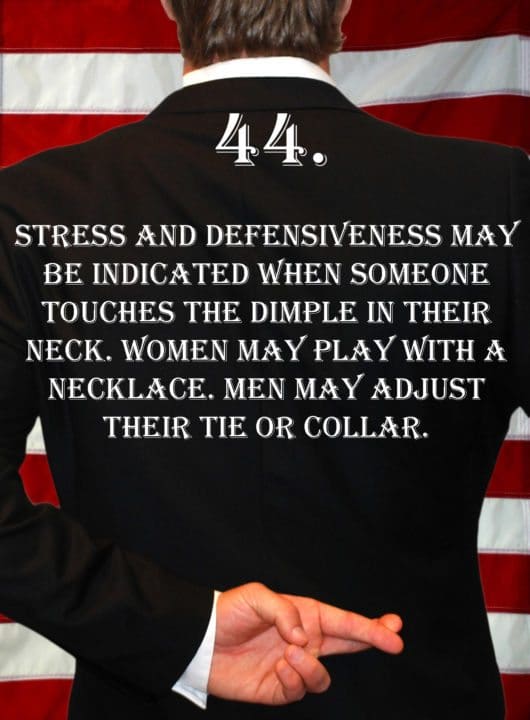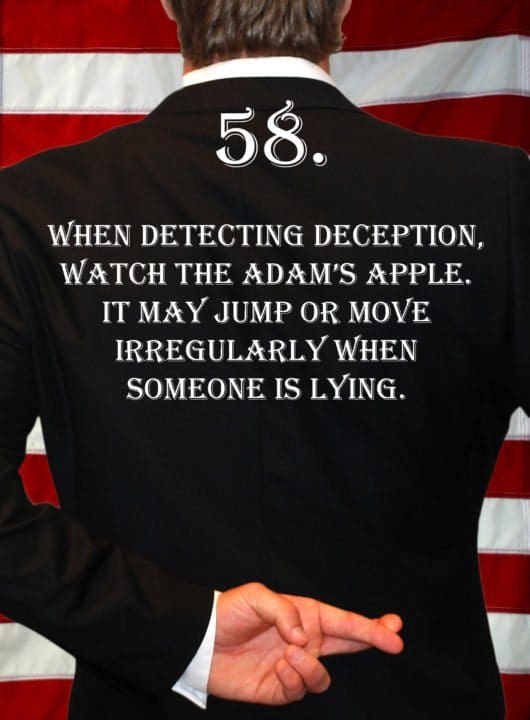
Deception Tip 4:
While reciting a rehearsed lie, it is difficult to perform physical tasks, such as making coffee.
The liar will most likely stand perfectly still with items in hand.
Listen To The Podcast!
E4 – Physical Tasks – Deception Tips Podcast – Click Here To Subscribe
Podcast Transcript
Hello, and welcome to the Deception Tips Podcast, where you will learn amazing cues to detect deceit that will help you read people like never before. I’m your host, Spencer Coffman. Let’s get started.
Welcome to episode 4 of the Deception Tips Podcast. Last time, we went over how a person can display contradictory behaviors when he or she tells a lie. The reason this happens is that the unconscious is very truthful. Therefore, when the conscious tells a lie, the unconscious tries its hardest to tell the truth.
There’s a constant battle between the conscious and the unconscious. The unconscious is ALWAYS fighting for the truth and the conscious is butting heads constantly to get away with that lie. This contradictory behavior happens because of that fight. They are in opposition to each other, so one tries to perform one behavior and the unconscious performs a contradictory behavior to try to let the truth out.
This particular behavior takes the form when a person answers “yes” consciously to a question while his or her head may shake “no” or, vice versa, they answer “no” to a question and unconsciously his or her head will nod “yes.”
This usually happens with direct yes-or-no questions where the liar tries to lie as quickly as possible. Remember when someone lies, he or she is under a great amount of stress already because of thinking about lying. So they’re already stressed.
Therefore, when they’re presented with the opportunity to get that lie out, they will do so quickly. This is why that contradictory behavior happens quite often with instant yes-or-no questions, and answers because it’s something where the lie takes place so quickly that the unconscious needs to make a behavior happen right away.
Now, most of the time, the behaviors happen instantly, as we’ve discussed before, they happen in a fraction of a second, but in this case, someone says “no” right away to a question, the unconscious is quickly shaking its head, yes to try and make that a truth.
Remember sometimes though, it may happen automatically, where the person doesn’t even know he or she is lying. This can be the case when people have suppressed memories or they weren’t paying attention or they forgot that they went somewhere or did something, so that when they’re asked about that they truly, consciously, believe that they didn’t do it whereas the unconscious, where it logs every memory, remembers, and then displays that sign of truth, that leakage.
Today, we’re going to talk about another deceptive behavior. This one is blatantly obvious. In fact, it is such a great indicator of lying, that if you see it, you can be almost certain there is deception.
Of course, it’s tough to know exactly in what area that person is being deceptive. Is it the whole story? Is it a certain answer or a certain aspect of the story? Or is it one little phrase? Is it something they thought of but didn’t say?
There are so many different possibilities, but the main thing is that when you see this behavior it is a very, very telltale sign of deception. And it’s one that you don’t really need to see with other behavioral clusters, so it’s kind of a stand-alone behavior.
Obviously, you would want to prod for a few more confirming behaviors and some clusters that may go with it, but this behavior is a very telltale sign in and of itself. You will need to do some further questioning and look for additional signs of deception, but in the meantime, if you see this, it is a MAJOR red flag.
So here it is, Deception Tip 4: While reciting a rehearsed lie, it is difficult to perform physical tasks, such as making coffee. The liar will most likely stand perfectly still with items in hand. Let me say it again. While reciting a rehearsed lie, it is difficult to perform physical tasks, such as making coffee. The liar will most likely stand perfectly still with items in hand. Note that I said “a rehearsed lie.”
This behavior won’t always happen if someone is lying on the spot. The reason is that when someone is lying on the spot, it is pretty much the same as regular conversation. By that I mean when we speak in everyday conversation, we’re speaking off the cuff, we’re winging it, we’re coming up with the speech naturally. It’s pouring through our brain, and coming out our lips, simultaneously, pretty much with the time we think of it and the time we say it.
Rarely, do we rehearse all the words we speak? Most of the time, we talk naturally and they flow as we think of them. We have conversations while we perform many physical tasks and we think nothing of it. For instance, you may have a conversation with somebody while you’re fixing your car or while you’re performing some task in the office while you’re making copies, maybe while you’re tying your shoe. You could have conversations while doing any different task that you don’t even think of and it’s something you do on a natural basis.
Of course, there are those who are inept and cannot talk and work at the same time. You know exactly the type of people I’m talking about. They type that, when you’re working on doing something, if you’re doing a home repair, or painting a wall, you’re talking, you’re working, and you talk to the person next to you and they stop working to try to respond to you and you think “Man, why did I ask them?
Now they’re not helping me get this done!” Anyway, for the most part, most people can do everyday tasks well in normal conversation, but there are those who can’t. They must stop. They can’t even walk and chew gum at the same time.
So when they tell a spontaneous lie, it gives the body the same physiological reaction as everyday spontaneous conversation. Therefore, they may still be able to do some physical tasks because the lie is spontaneous it takes the form of spontaneous conversation.
If those people though, who can’t work and talk at the same time, tell a spontaneous lie, they’re most likely not going to continue doing that physical task because they can’t do physical tasks anyway when they talk.
On the other hand, if someone has rehearsed a lie, as in they have planned the alibi or the story. They’ve consciously thought it up. They’ve gone over and over in their mind. They may have even stated it out loud, whether in the mirror or somehow they’ve practiced this lie.
They’ve rehearsed it. They will most likely pause when reciting the lie if they’re doing some sort of physical task. We’ll talk more about the reasons why this occurs when we come back.
Want to be a lie spotter but don’t have time to do the research? Check out Spencer Coffman’s Deception Tips blog and learn how to detect deception. You’ll be an expert at detecting lies. That’s spencercoffman.com
Let’s say you’re questioning your co-worker, your kid, your spouse, or anyone about something they may or may not have done. You want to hear their side of the story. Rather than sitting them down across from you at a table and having a formal conversation with them, try to make it a little more casual.
Hit them up when they’re making their morning pot of coffee or a cup of tea or when they’re stirring in their sugar and cream. Spring it on them. When they’re doing some form of physical task, like washing the dishes or fixing the food or anything that requires a little bit of dexterity and thought.
You want to find something that they do often enough so that it becomes a form of habit but not so often that they do it without thinking. It needs to be the medium and it can’t be something they haven’t done enough that they need to focus hard on it. It needs to be something they have done frequently, but not too frequently.
It can’t be something that they haven’t done frequently because if they need to think a lot about what their doing then this isn’t going to work because you need them to be doing a task that is like second nature. That way when you tell them to answer your question or spring something on them and you elicit a potential lie, then it’s going to throw them for a loop in that everyday behavior and something is going to change.
If he or she stops the task while telling you the story then you may have trouble. Of course, you need to know whether or not this is the type of person who usually pauses when talking because if they normally pause when talking and then you ask them this question, and they pause when talking, then nothing’s changed. That’s just their nature. However, if they’re normally competent enough to work and talk at the same time, and you ask something and then they pause, now a red flag goes up.
The same thing could be true in the other direction. If somebody who normally someone who pauses when talking and this time you ask him a question and they keep right on working, doing whatever they’re doing while they’re answering, now that could be suspicious because that’s a red flag.
If they normally work and talk but stop when telling this particular story then they’re most likely lying about something. Or if they normally stop working while talking but they kept working while talking in this particular story, then they are most likely lying about something. You have found a deviation from normal behavior, a red flag.
The reason this happens is that while they’re making coffee, let’s say, and talking they are performing two unconscious tasks. Sure they’re consciously doing them, but they do them often enough that it is like second nature. It is a habit, and therefore it is predominantly unconscious.
It is something they don’t even have to think about doing. It just happens. They go there, they do it. It’s like riding a bike, you kind of never forget it. It’s something that you may not consciously think about or if you have to tell someone how to do it, it may be tough, but when you go there and do it, you just do it.
When he or she is doing that and they tell a lie, they are adding another stressor to the unconscious. He or she is consciously telling the lie that was rehearsed. So the conscious has rehearsed this lie over and over and over with the hopes of sneaking it out and getting it through without the unconscious detecting it.
While the unconscious is busy trying to fight for the truth and doing these tasks, it says “Wait a minute. That was a rehearsed lie that just tried to get past me.” So it’s STOPS all other tasks and tries to leak some sort of behavior before that lie is over before it’s too late. The unconscious is battling so hard to try to get it out and the conscious is working so hard to sneak it by.
By rehearsing it, the conscious believes that “I can get this lie right past the unconscious because it’s something that I practiced so now it will seem like it is truth. I can rehearse it over and over enough times so that I can start to believe the lie.” Then the conscious will believe that it is the truth. However, when this happens, the unconscious still is suspicious. So it stops making the coffee or stops doing that task to think for a minute of what behavior it can leak before that lie is over.
Fortunately, stopping is a great form of leakage in and of itself. So the unconscious is unknowingly, or perhaps knowingly, has displayed a form of leakage that is so blatantly obvious, that it is indicative of a sign of deception.
As always though, you will want to follow up this observance with some more targeted questions to see if you can pinpoint the exact lie. See if you can find out if the entire story was a lie or if there were only certain aspects that they were lying about. Find out what was the truth and what was a lie. And you’ll want to do this in casual additional questioning.
State some follow-up questions and make sure to look for other signs of deception. Don’t keep talking to them every time they’re making coffee or they may get suspicious. You want to use that as your entryway, use that as your confirmation and then maybe bring in some other things.
Maybe when they’re done making their coffee you guys could sit down at the table and you can keep talking and ask some more questions and just watch their bodies to see if they unconsciously leak any other signs of deception that you’ve learned about. And if they do, when do they do it? What are they talking about when they leak those signs.
Continue asking those questions and if you keep seeing those behaviors that you can really easily narrow down what portion is untrue. Of course, make sure to rephrase your questions and ask them in different ways so that they don’t consciously, and unconsciously, realize that you’re hammering them on the same question. If they do, all their defense shields are going to go up and you’ll never get anywhere.
Use making coffee, or whatever physical task, as a confirmation because it is one of the signs that doesn’t require multiple clusters to occur with it. It is something that you can see and have a pretty good idea that there is a like happening.
Always ask, again and again, in different ways and at different times. You don’t need to get to the truth this instant unless it is some matter of life and death or a very important thing. So think about it and be ok with the fact that you may not get to the truth right now but keep talking to them on different occasions throughout the day and keep asking questions in different ways so that you can elicit the truth. This will help you be certain that what you saw the first time was indeed a genuine sign of deception.
I want to thank you for listening to this podcast and I encourage you to share it with your friends, subscribe to the feed, follow the Deception Tips blog, take a look at the books I have available, and, as always, tune in for a new Deception Tip.
Video Transcript
Hey guys my name is Spencer Coffman. Thank you for watching the deception tips videos. They’re all about teaching you how to read people and detect deception so that you will know if someone is lying to you.
Today, we are going to talk about a cool behavior that is like a little bit of a hack when it comes to reading people and determining whether or not they are telling the truth. This is something that you can kind of push on someone to have them solicit a response that will tell you whether or not they are being truthful. You’re going to kind of probe for a normal reaction. And if that reaction doesn’t happen, then that’s a red flag for you. So here it is, deception tip number four: “While reciting a rehearsed lie, it is difficult to perform physical tasks, such as making coffee. The liar will most likely stand perfectly still with items in hand.”
So they will stand still. They may be pouring the coffee or putting the water into the pot and you get asked a question, or you ask them a question, and they stop. And nothing happens. Why does nothing happen? Well the reason is because when people lie, there is a lot of mental activity that has to go on. The conscious and the unconscious are fighting over what is going to come out. The unconscious is trying to push the truth, the conscious is trying to get away with a lie or is trying to tell a lie.
And now, one thing that is important to point out here is it is while reciting a rehearsed lie. So this doesn’t mean a spontaneous lie. Like if you ask me, did I like something or do I do something, and I just instantly come up with a lie on the spot. That will not be as effective when someone is doing a physical task. However, if I have rehearsed a lie or planned a lie, or if someone is trying to get away with something, or if like you’re asking someone if they took out the trash, or if they did their chores, or whatever.
If your son or daughter is emptying the dishwasher and you say “did you do your homework yet?” And they stop immediately and think about the response and give it to you, that could be a rehearsed lie, and they stop. Now the reason that people stop when doing these physical tasks is because these physical tasks are somewhat unconscious. Making coffee.
Can you make coffee in your sleep? Most of us do. Most people wake up in the morning, they drag down to the coffee pot, they either put in their K-cup or put in the grounds or sometimes you have ready the night before, and you hit the on button or it’s on a timer, whatever the case may be. A lot of people can do things like that in their sleep. So it’s an unconscious behavior. Now the reason that people stop doing this behavior when they lie is because the unconscious is trying so hard to leak some sort of nonverbal or verbal cue so that the truth can come out.
Now, unknowingly, stopping this behavior is one of those cues. So you can probe for this. If someone is doing a menial task that is pretty much unconscious, you can start asking them certain questions as to whether or not they did or did not do something and if they have stopped, or if they pause, or if they have to think about it, that can be a red flag for you. But keep in mind one very important point is that there are some people who cannot work and talk at the same time.
These people are the kind that when they’re working and they have to tell their story, then all the sudden they just stop whatever they’re doing and they start talking and you’re like, “boy, why did I ask?” Because now they’re not going to shut up and nothing’s going to get done. Some people can’t walk and chew gum at the same time. So if that is a type of person that you’re dealing with, and they stop making the coffee to answer your question, now that’s not a red flag because that’s their normal behavior.
However, if they continued making the coffee while talking, now that’s a deviation from their normal behavior. And that is a red flag. So this is another very important point. Anytime you are looking for deception, you need to find their baseline behavior and then you find a deviation from that. So if they normally can work and talk at the same time and then they stopped working while they’re talking, that is a deviation.
However, if they normally cannot work and talk at the same time, but they continue working and talking, that would be a deviation in that circumstance. And keep in mind it’s always important to look for more than one sign. There will always be more than one sign. Because the unconscious is always trying to leak the truth and the conscious, while telling a lie, is going to continually tell that lie until it’s convinced that someone believes it.
I want to thank you for tuning in to these videos. They’re all about teaching you how to read people and detect deception. I would love it if you subscribed to the channel on YouTube. Throw in any comments if you have any questions. In addition, if you’d like more information, there’s a lot of information such as books, ebooks, podcasts, blog posts, all available on SpencerCoffman.com. That are dedicated to teaching you exactly what every body is saying.
Until next time.






